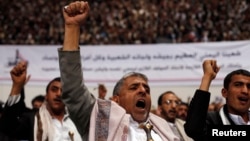The Houthi motto sounds ominous to Western ears: "Death to America, Death to Israel, curse the Jews, long live Islam."
But according to Middle East Institute scholar Charles Schmitz, that's a bit deceptive.
"That chant is not meant to be anti-American," he said.
Instead of merely reflecting antipathy toward the U.S., Schmitz said, the chant was more aimed at Yemen's former U.S.-backed authoritarian leaders.
"It was meant to stick a thorn in the side of the president, who at the time after the U.S. invasion of Iraq was defending the U.S. Embassy, was defending his relationship on the war on terror with the Bush administration," he said. "So the thorn was to say, 'We are authentically Yemeni. We don't serve foreign interests.' "
Longtime President Ali Abdullah Saleh was a major ally in the U.S. war on Islamist extremists, who have taken refuge in Yemen in increasing numbers in recent years.
Saleh was forced out of office in 2012 by Arab Spring protests. He was replaced by a close ally, Abd Rabbuh Mansour Hadi.
But after Houthi rebels this month surrounded the seats of power in Sanaa, the president, the prime minister and his Cabinet tendered their resignations, leaving the Houthis as de facto leaders.
U.S. officials told various news outlets this week that they had begun reaching out to the Houthis on security issues.
A top priority is to continue U.S. drone strikes on militants affiliated with al-Qaida in the Arabian Peninsula. AQAP, as it is known, is gaining in strength and claimed responsibility for the January attacks on the Charlie Hebdo magazine in France.
The Shiite Houthis, despite their anti-U.S. slogans, are also battling AQAP, leaving some possible room for cooperation with the U.S.
Still, Washington officials are leery of becoming involved in another conflict in an Arab country.
Yemen Embassy spokesman Mohammad Albasha played down that threat Friday.
"This is not a Sunni-Shia war in Yemen," he said. "It has nothing to do with Shias and Sunnis. This is a political crisis, with political resolutions, hopefully."
Albasha told a forum at the Wilson Center in Washington that he had been in close contact with different factions involved in negotiations about Yemen's future government.
"They all said that there were problems, but they all reassured me that they're moving towards the political resolution," he said. "No one wants to pick up the guns and fight."
As those negotiations move forward, it is not clear who, if anyone, is in control of the country.
But as Albasha told #VOA this week, if there is no quick solution to the problem, the country is "definitely going to be heading toward chaos."











